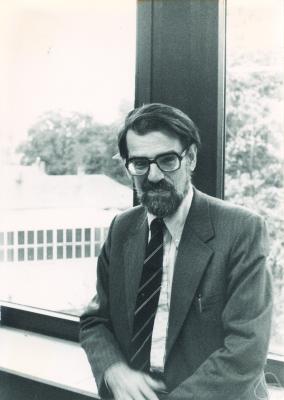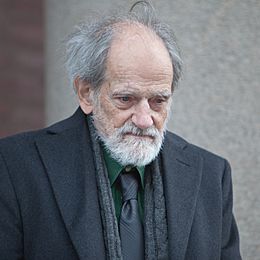Lloyd Shapley facts for kids
Quick facts for kids
Lloyd Shapley
|
|
|---|---|

Shapley in 1980
|
|
| Born |
Lloyd Stowell Shapley
June 2, 1923 Cambridge, Massachusetts, U.S.
|
| Died | March 12, 2016 (aged 92) Tucson, Arizona, U.S.
|
| Alma mater | Princeton University Harvard University |
| Known for | Shapley value Shapley–Shubik power index stochastic games Bondareva–Shapley theorem Shapley–Folkman lemma & theorem Gale–Shapley algorithm potential game core, kernel and nucleolus market games authority distribution multi-person utility non-atomic games |
| Spouse(s) | Marian Louise Shapley (since 1955) |
| Awards | Nobel Memorial Prize in Economic Sciences (2012) Golden Goose Award (2013) John von Neumann Theory Prize (1981) |
| Scientific career | |
| Fields | Mathematics, economics |
| Institutions | University of California, Los Angeles RAND Corporation Princeton University |
| Thesis | Additive and non-additive set functions |
| Doctoral advisor | Albert W. Tucker |
| Influences | John von Neumann Martin Shubik Jon Folkman |
| Influenced | Martin Shubik Jon Folkman |
Lloyd Stowell Shapley (born June 2, 1923 – died March 12, 2016) was a very important American mathematician and economist. He won the Nobel Memorial Prize in Economic Sciences in 2012. Shapley was best known for his big contributions to a field called game theory. Game theory is a way to study how people or groups make decisions when they depend on each other.
Contents
Life and Career
Lloyd Shapley was born on June 2, 1923, in Cambridge, Massachusetts. His parents, Harlow Shapley and Martha Betz Shapley, were both famous astronomers.
Early Life and Education
Lloyd went to Phillips Exeter Academy for school. He then started studying at Harvard University. In 1943, during World War II, he joined the United States Army Air Corps. He served in Chengdu, China. He even received the Bronze Star Medal for figuring out a secret weather code used by the Soviets.
After the war, Shapley went back to Harvard. He earned his degree in mathematics in 1948. He then worked for a year at the RAND Corporation. This was a research organization.
Princeton and Game Theory
In 1953, Lloyd Shapley earned his Ph.D. from Princeton University. His studies focused on game theory. He described game theory as "a mathematical study of conflict and cooperation." This means it looks at how people or groups make choices when they are competing or working together.
While at Princeton, Shapley developed two key ideas in game theory: the Shapley value and the core solution. These ideas help understand how to share things fairly or how groups can work together.
Later Work and Nobel Prize
After Princeton, Shapley returned to the RAND Corporation. He worked there from 1954 to 1981. In 1950, he helped invent a board game called So Long Sucker. He created it with other smart people like John Forbes Nash.
From 1981 until he passed away, Shapley was a professor at the University of California, Los Angeles (UCLA). He taught in both the Mathematics and Economics departments. He died on March 12, 2016, in Tucson, Arizona, at 92 years old.
Lloyd Shapley was also a skilled player of Kriegspiel, a type of chess. He was also a big fan of baseball.
Contributions to Economics
Lloyd Shapley made many important contributions to the fields of mathematics and economics. His ideas are still used today.
Key Ideas and Concepts
- Shapley Value: This idea helps decide how to fairly divide the benefits among players in a team or group.
- Stable Marriage Problem: With David Gale, he created the Gale–Shapley algorithm. This algorithm helps match people (or things) in a stable way. For example, it can be used for college admissions or matching doctors to hospitals.
- Shapley–Shubik Power Index: This helps measure how much power each person has in a voting system.
- Stochastic Games: These are games where the situation can change randomly over time.
Many other ideas in game theory are named after him. The Economist magazine said that even though Shapley saw himself as a mathematician, he will always be remembered for his huge impact on economics. The American Economic Association called him "one of the giants of game theory."
Nobel Prize
In 2012, Lloyd Shapley won the Nobel Memorial Prize in Economic Sciences. He shared the award with Alvin E. Roth. They won for their work on "stable allocations and the practice of market design." This means they found ways to make sure people get good matches in markets, like finding a job or getting into a school.
Shapley wasn't sure if he should accept the Nobel Prize at first. He thought his father, the astronomer, deserved it more. But his sons convinced him to accept it, and they went with him to Stockholm for the award ceremony.
Awards and Honors
Lloyd Shapley received many awards and honors throughout his life:
- Bronze Star Medal, U.S. Army Air Corps, 1944
- Procter Fellow, Princeton University, 1951–52
- Fellow, Econometric Society, 1967
- Fellow, American Academy of Arts and Sciences, 1974
- Member, National Academy of Sciences, 1978
- John von Neumann Theory Prize, 1981
- Honorary Ph.D., Hebrew University of Jerusalem, 1986
- Fellow, INFORMS (Institute for Operations Research and the Management Sciences), 2002
- Distinguished Fellow, American Economic Association, 2007
- Fellow, American Mathematical Society, 2012
- Sveriges Riksbank Nobel Memorial Prize in Economic Sciences, 2012
- Golden Goose Award, 2013
See also
- Matching theory (economics)
 In Spanish: Lloyd Shapley para niños
In Spanish: Lloyd Shapley para niños
 | Percy Lavon Julian |
 | Katherine Johnson |
 | George Washington Carver |
 | Annie Easley |


